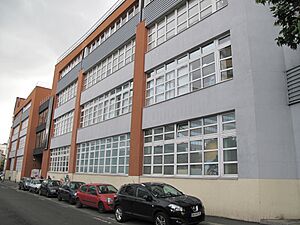Ubisoft facts for kids

Logo used since 2017
|
|

Main office in Montreuil, France
|
|
|
Formerly
|
Ubi Soft Entertainment SA (1986–2003) |
|---|---|
| Public | |
| Traded as |
|
| ISIN | [https://isin.toolforge.org/?language=en&isin=FR0000054470 FR0000054470] |
| Industry | Video games |
| Founded | 28 March 1986 |
| Founders |
|
| Headquarters |
Saint-Mandé
,
France
|
|
Area served
|
Worldwide |
|
Key people
|
|
| Products | See List of Ubisoft games |
| Brands |
|
| Services | Ubisoft Connect |
| Revenue | |
|
Operating income
|
|
| Total assets | |
| Total equity | |
| Owners |
|
|
Number of employees
|
18,666 (2024) |
| Subsidiaries | See list of Ubisoft subsidiaries |
Ubisoft Entertainment SA is a French company that creates and sells video games all over the world. It was started on March 28, 1986, by the five Guillemot brothers in Brittany, France. The company is led by Yves Guillemot, who has been the CEO since 1988. Ubisoft is one of the biggest video game companies in the world, with over 45 studios in more than 28 countries.
Ubisoft is famous for creating popular game series like Assassin's Creed, Far Cry, Tom Clancy's, and Just Dance. These games have sold millions of copies. In the past, Ubisoft sold games in boxes at stores. Now, most of its sales are digital, through downloads and services like Ubisoft+, which is a subscription service launched in 2019.
In recent years, Ubisoft has faced some money problems and issues with its workplace environment. The company is working on making changes to improve its business and how it is seen by the public.
History
How Ubisoft Started (1986–1996)
In the 1980s, the Guillemot family ran a business that helped farmers in France. The five brothers—Christian, Claude, Gérard, Michel, and Yves—helped their parents with the company. After college, they had new ideas for the family business. They started selling computers and video games to farmers.
The brothers realized they could buy computers and games cheaper in the United Kingdom and sell them in France. They started a mail-order business called Guillemot Informatique in 1984. It was very successful because they could sell games for much less than other stores.
Seeing how popular video games were, the brothers decided to start making their own. On March 28, 1986, they founded Ubi Soft. The name "Ubi" was chosen to mean "everywhere" software. Their first game was called Zombi.
They set up a development studio in a castle in Brittany to attract talented game makers. One of these was a young animator named Michel Ancel. Later, the company moved to Paris. Ancel, who couldn't move to Paris, later created a game prototype that impressed the brothers. This game became Rayman, which was a big hit when it was released in 1995 for consoles like the PlayStation.
Growing Around the World (1996–2003)
In 1996, Ubi Soft began selling shares of the company to the public. This raised over $80 million, which helped the company grow. They opened new studios in cities like Annecy (France), Shanghai (China), Montreal (Canada), and Milan (Italy).
The company wanted a popular game series in the United States. In 2000, they bought Red Storm Entertainment, which gave them the rights to the Tom Clancy's spy games. This led to hit series like Tom Clancy's Ghost Recon and Tom Clancy's Rainbow Six. They also worked with Microsoft to create Tom Clancy's Splinter Cell for the Xbox.
In 2001, Ubisoft bought The Learning Company's entertainment division. This deal included the rights to famous games like the Myst and Prince of Persia series. Ubisoft Montreal then created the successful game Prince of Persia: The Sands of Time, released in 2003.
Creating Famous Games (2003–2015)
On September 9, 2003, Ubi Soft changed its name to Ubisoft and introduced a new swirl logo. In 2004, another big game company, Electronic Arts (EA), bought a large part of Ubisoft. The Guillemot brothers worried that EA might try to take over their company, but EA sold its shares in 2010.
Ubisoft continued to create new and exciting games. In 2007, they launched Assassin's Creed, a game that was originally planned as a sequel to Prince of Persia. It became a huge success and one of Ubisoft's most famous series.
The company also bought other game franchises, like Driver from Atari in 2006. In 2008, they made a deal to use author Tom Clancy's name for games and other media forever. Over the years, Ubisoft bought several other game studios, including Massive Entertainment in 2008.
A Company Takeover Attempt (2015–2018)
Starting in 2015, a large French media company called Vivendi began buying shares of Ubisoft. The Guillemot brothers felt this was a "hostile" move, meaning Vivendi was trying to buy Ubisoft without their agreement. Yves Guillemot said it was important for Ubisoft to stay independent to protect its creative freedom.
Vivendi continued to buy more shares, and by 2016, they owned over 20% of Ubisoft. The Guillemot family fought to keep control, asking Canadian investors for help. At a big company meeting, they successfully blocked Vivendi from getting seats on Ubisoft's board of directors.
The fight continued for a few years. Finally, in March 2018, Ubisoft and Vivendi made a deal. Vivendi agreed to sell all of its shares and promised not to buy any more for five years. A company called Tencent bought some of these shares and agreed to help Ubisoft bring its games to China.
Recent Years and New Challenges (2018–Present)
Ubisoft continued to focus on its biggest game series, like Assassin's Creed and Far Cry. However, the company noticed that many of its games felt too similar. In 2020, Ubisoft announced it would change its creative teams to bring more variety to its games.
In 2020, Ubisoft faced serious problems when many employees reported issues about the workplace culture. This led to several top managers leaving the company. CEO Yves Guillemot promised to make major changes to fix these problems.
Starting in 2021, Ubisoft began to focus more on free-to-play and mobile games, in addition to its big AAA titles. The company also announced it was making a new open-world Star Wars game.
However, Ubisoft has faced financial difficulties. Several games released in 2024, such as Skull and Bones and Star Wars Outlaws, did not sell as well as expected. This caused the company's stock value to drop. As a result, Ubisoft delayed its next major game, Assassin's Creed Shadows, to February 2025 to improve its quality. The company also closed some of its studios and reduced its number of employees to cut costs.
Technology Behind the Games
Ubisoft Connect
Ubisoft Connect (once called Uplay) is a service for PC gamers. It's a digital store, a place to chat with friends, and a system that manages game ownership. It also has a rewards program where players can earn points for completing in-game challenges. These points can be used to unlock special content in games. Ubisoft Connect also allows players on different consoles to play together in some games.
Game Engines
A game engine is the basic technology used to create a video game. Ubisoft has developed several of its own powerful engines.
Ubisoft Anvil
This engine was first created for the original Assassin's Creed game. It has been updated and used for most games in the series, as well as for other titles like For Honor.
Disrupt
The Disrupt engine was built for the Watch Dogs series. It is very good at creating large, detailed cities and allowing players to join or leave online games smoothly.
Dunia
The Dunia engine is a modified version of the CryEngine, which was used to make the first Far Cry game. Ubisoft improved the engine to add features like destructible environments and realistic weather. It has been used for all Far Cry games since Far Cry 2.
Snowdrop
The Snowdrop engine was created for Tom Clancy's The Division. Its special node-based system makes it easier for developers to build complex game worlds. It has also been used for games like Mario + Rabbids: Kingdom Battle and Avatar: Frontiers of Pandora.
Games
Ubisoft realized that players enjoy games where they can easily switch between playing alone and playing with friends online. This led the company to create more "connected sandbox" games. A sandbox game is one that gives players a lot of freedom to explore and play how they want.
Games like The Crew were some of the first from Ubisoft that required players to always be connected to the internet. This showed the company's new direction towards creating online, social gaming experiences.
Film and Television
In 2011, Ubisoft started a division to create movies and TV shows based on its games, called Ubisoft Film & Television. It has produced the live-action movie Assassin's Creed (2016) and TV shows like Rabbids Invasion and Mythic Quest.
Legal Issues
Like many large companies, Ubisoft has been involved in several lawsuits.
- In 2008, Ubisoft sued a company for leaking the PC version of Assassin's Creed before it was released.
- In 2012, an author claimed the Assassin's Creed series used ideas from his book. He later dropped the lawsuit.
- In 2020, Ubisoft sued a mobile game developer, claiming their game was a copy of Tom Clancy's Rainbow Six Siege.
- In 2024, a lawsuit was filed against Ubisoft after it announced it would shut down the servers for the game The Crew. Players argued that this meant they could no longer play a game they had purchased.
See also
 In Spanish: Ubisoft para niños
In Spanish: Ubisoft para niños
 | Selma Burke |
 | Pauline Powell Burns |
 | Frederick J. Brown |
 | Robert Blackburn |


